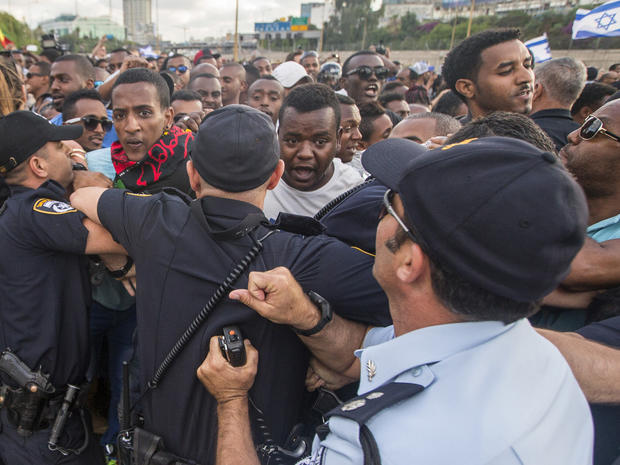Protests expose "bleeding wound" in Israeli society
JERUSALEM -- Israel's president says violent protests by Ethiopian Jews have "exposed an open, bleeding wound in the heart of Israeli society" and that the country must respond to their grievances.
Reuven Rivlin spoke Monday, a day after thousands of people clashed with police in Tel Aviv. The protesters shut down a major highway, hurled stones at police officers and overturned a squad car. They were ultimately dispersed with tear gas and water cannons. More than 60 people were wounded and 40 arrested.
Simmering frustrations among Israel's Ethiopian community boiled over after footage emerged of an Ethiopian Israeli in an army uniform being beaten by police. Ethiopian Jews began migrating to Israel three decades ago. Many complain of racism, lack of opportunity, endemic poverty and routine police harassment.
CBS Radio News correspondent Robert Berger reports that Prime Minister Benjamin Netanyahu met Monday with the Ethiopian-Israeli soldier whose beating sparked the riots. Netanyahu also met Monday with leaders of the Ethiopian-Israeli community.
The prime minister said he was shocked by the video and that the situation must change. But Ethiopian activists say the beating is part of a systematic pattern of police brutality, racism and discrimination in Israel.
Several thousand people from the minority community protested in Tel Aviv on Sunday, shutting down a major highway and clashing with police on horseback long into the night.
The protest was mostly peaceful during the day, but by nightfall became violent with at least 20 officers hurt and "multiple protesters" arrested, Police Spokesman Micky Rosenfeld said.
Protesters threw rocks and bottles at officers in riot gear. Police deployed officers on horseback and used stun grenades to try and control the crowds in central Tel Aviv.
Channel 2 TV said the protesters came from all over the country.
"I am here to fight for our rights," a woman named Batel from the northern city of Nazareth Illit told the station.
"I don't want to be beaten by police," said the 21-year-old, who didn't give her last name. "My parents didn't immigrate here for nothing. I want equality."
Simmering frustrations among Israel's Ethiopian community boiled over when the video emerged of the Ethiopian in an army uniform being beaten by police.
Thousands of Ethiopian Jews live in Israel, many of them secretly airlifted into the country in 1984 and 1990, but their absorption into Israeli society has been difficult.
Police chief Yohanan Danino told Channel 10 TV that "the use of violence by a small minority of the many protesters does not serve their struggle." He added, "Whoever harms police or civilians will be brought to justice."
Activists told the station they don't want violence to escalate to the level seen in Baltimore where the death of a man in police custody sparked riots. One man held a sign reading: "Bibi, you had better not let Baltimore reach Israel," referring to Netanyahu by his nickname.
Sunday's was the second such protest in several days, and supporters said the demonstrations would continue. The first rally last week in Jerusalem turned violent as well, but on a smaller scale.
Public Security Minister Yitzhak Aharonovich told Channel 2 the officers caught in the video were "a disgrace" and were being investigated. He said Israel's police force "needs to examine itself" and that more needs to be done to help the Ethiopian community.
